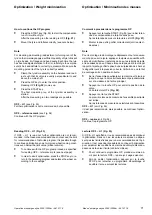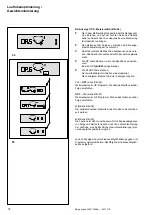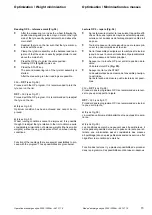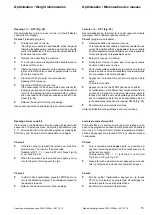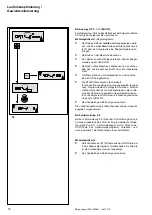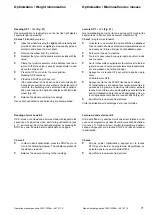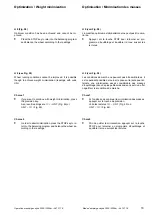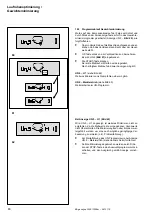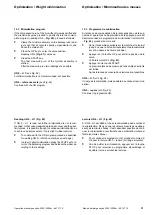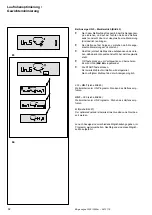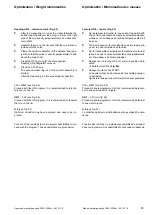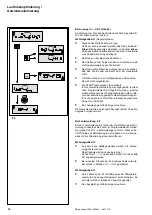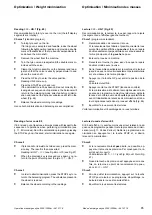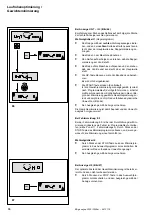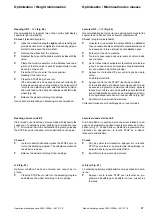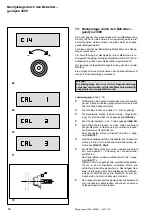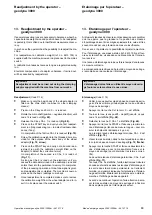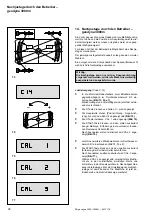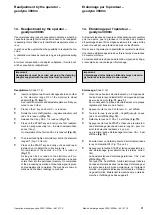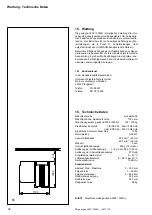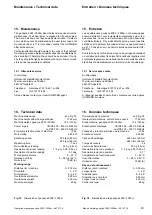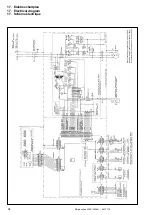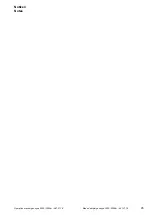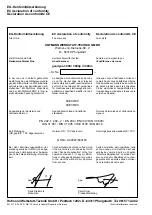
85
Operation manual geodyna 3000 / 3000m – 9412 178
Mode d’emploi geodyna 3000 / 3000m – 9412 178
Optimization / Weight minimization
Reading === – UN.7 (Fig. 65)
Recommendation to turn tyre over on the rim (the left display
segments are rotating).
Choice 1 (standard program)
•
Turning tyre over on the rim.
If turning over is accepted and feasible, index the wheel
following the left position reading and provide a double
mark on the left side of the tyre exactly perpendicular to
and above the main shaft.
•
Remove the wheel from the machine.
•
Turn the tyre over and readjust until the double mark co-
incides with the valve.
•
Clamp the tyre/rim assembly on the balancer and read-
just such that the valve is exactly perpendicular to and
above the main shaft.
•
Press the OP key to enter the valve position.
Reading UN.8 comes up.
•
Press the START key (check run).
If the minimization run has been carried out correctly fol-
lowing above sequence of operations, the balancer will
return to the balancing mode selected before minimiz-
ation and read out the dynamic unbalance still left in the
wheel (Fig. 65).
•
Balance the wheel according to readings.
Hence both minimization and balancing are accomplished.
Reading of error code E 9
If E 9 is read out, at least one error was made with respect to the
sequence of operations when performing minimization (see
§ 11. Error codes). Abort the minimization program by pressing
the STOP key and, if desired, start minimization once again.
Choice 2
•
If tyre cannot or is not to be turned over, press the preci-
sion key. The result is then converted.
Reading is UN.7 – = = = (see Fig.66) or H 0 (see Fig. 67).
•
When the precision key is pressed once again, you re-
turn to the point of turning over the tyre === – UN.7 .
Choice 3
•
In order to abort minimization, press the STOP key to re-
turn to the balancing program. The unbalance present in
the wheel is read out.
•
Balance the wheel according to the readings.
Optimisation / Minimisation des masses
Lecture === – UN.7 (Fig. 65)
Recommandation de renverser la roue par rapport à la jante
(les segments de l’afficheur gauche tournent).
Choix 1 (programme standard)
•
Recommandation de renverser la roue.
Si le renversement est désiré et possible, orienter la roue
suivant la position affichée à gauche et faire un repère
double exactement perpendiculaire sur et au-dessus de
l’arbre principal du côté gauche du pneu.
•
Enlever la roue de la machine.
•
Renverser et tourner le pneu jusqu’à ce que le repère
double coïncide avec la valve.
•
Serrer l’ensemble pneu/jante sur la machine et le tourner
jusqu’à ce que la valve soit exactement perpendiculaire
sur et au-dessus de l’arbre principal.
•
Appuyer sur la touche OP pour entrer la position de la
valve.
Voilà la lecture UN.8.
•
Appuyer sur la touche START (lancée de contrôle).
Si la minimisation a été dûment accomplie suivant la sé-
quence de programme, la machine retournera, après la
lancée de contrôle, au mode d’équilibrage qui était choisi
avant l’initialisation de la lancée de minimisation et le ba-
lourd dynamique resté dans la roue est affiché (Fig. 65).
•
Equilibrer la roue suivant les lectures.
Voilà la minimisation et l’équilibrage de la roue terminés.
Lecture du code d’erreur E 9
Si E 9 est affiché, il y avait au moins une erreur relative à la sé-
quence de programme pendant toute la procédure de minimi-
sation (voir § 11. Codes d’erreur). Quitter le programme de mi-
nimisation en appuyant sur la touche STOP et, si désiré,
relancer la minimisation.
Choix 2
•
Si le renversement n’est pas désiré, ou possible, ap-
puyer sur la touche de précision. Par conséquent, le ré-
sultat, est-il converti.
Voilà la lecture UN.7 – = = = (voir Fig. 66) ou H 0 (voir Fig.
67).
•
Quand la touche de précision est appuyée encore une
fois, on retourne au point de renversement du pneu,
donc à === – UN.7 .
Choix 3
•
Afin de quitter la minimisation, appuyer sur la touche
STOP pour retourner au programme d’équilibrage. Le
balourd dans la roue est ensuite affiché.
•
Equilibrer la roue suivant les lectures.

